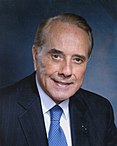Republican Party presidential primaries, 1996
|
|
|||||||||||||||||||||||||
|---|---|---|---|---|---|---|---|---|---|---|---|---|---|---|---|---|---|---|---|---|---|---|---|---|---|
|
|||||||||||||||||||||||||
|
|||||||||||||||||||||||||

Gold denotes a state won by Pat Buchanan. Green denotes a state won by Steve Forbes. Purple denotes a state won by Bob Dole. Grey denotes a territory that did not hold a primary.
|
|||||||||||||||||||||||||
|
|||||||||||||||||||||||||
The 1996 Republican presidential primaries were the selection process by which voters of the Republican Party chose its nominee for President of the United States in the 1996 U.S. presidential election. Former Senator Bob Dole of Kansas, former Senate Majority Leader was selected as the nominee through a series of primary elections and caucuses culminating in the 1996 Republican National Convention held from August 12 to August 15, 1996, in San Diego, California.
Following the 1994 midterm elections, many prominent candidates entered what would be a crowded field. This was expected as Democratic President Bill Clinton was very unpopular in his first two years in office, eventually leading to the Republican Revolution. However, as Clinton became increasingly popular in his third year in office, several withdrew from the race or decided not to run. Former U.S. Army Gen. Colin L. Powell was widely courted as a potential Republican nominee. However, on November 8, 1995, Powell announced that he would not seek the nomination. Former Secretary of Defense and future Vice President of the United States Dick Cheney was touted by many as a possible candidate for the presidency, but he declared his intentions not to run in early 1995. Then-Texas Governor George W. Bush was also urged by some party leaders to seek the Republican Party nomination, but opted against doing so.
...
Wikipedia



